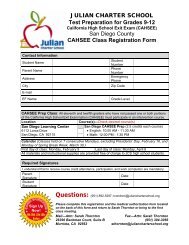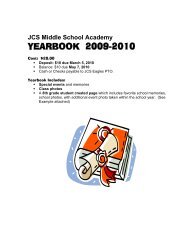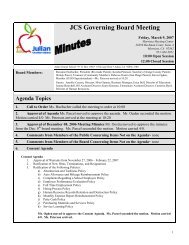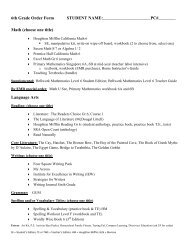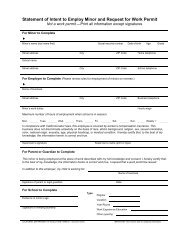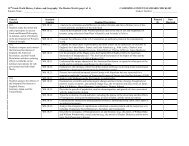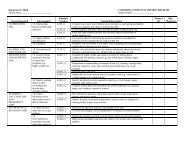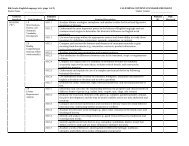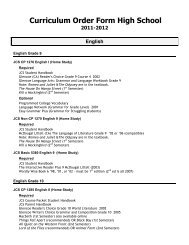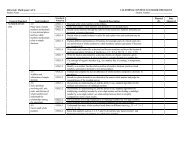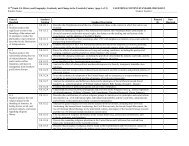12th Grade Principles of American Democracy (page 1 of 4 ...
12th Grade Principles of American Democracy (page 1 of 4 ...
12th Grade Principles of American Democracy (page 1 of 4 ...
You also want an ePaper? Increase the reach of your titles
YUMPU automatically turns print PDFs into web optimized ePapers that Google loves.
12 th <strong>Grade</strong> <strong>Principles</strong> <strong>of</strong> <strong>American</strong> <strong>Democracy</strong> (<strong>page</strong> 1 <strong>of</strong> 4) CALIFORNIA CONTENT-STANDARD CHECKLIST<br />
Student Name: ___________________________<br />
Student Number: ____________________<br />
General<br />
Standard<br />
12.1<br />
Students explain the<br />
fundamental principles and<br />
moral values <strong>of</strong> <strong>American</strong><br />
democracy as expressed in the<br />
U.S. Constitution and other<br />
essential documents <strong>of</strong> <strong>American</strong><br />
democracy.<br />
12.2<br />
Students evaluate and take and<br />
defend positions on the scope<br />
and limits <strong>of</strong> rights and<br />
obligations as democratic<br />
citizens, the relationships among<br />
them, and how they are secured.<br />
Standard<br />
Notation<br />
AD.12.1.1<br />
AD.12.1.2<br />
AD.12.1.3<br />
AD.12.1.4<br />
AD.12.1.5<br />
AD.12.1.6<br />
AD.12.2.1<br />
AD.12.2.2<br />
AD.12.2.3<br />
AD.12.2.4<br />
AD.12.2.5<br />
AD.12.2.6<br />
Standard Description<br />
Analyze the influence <strong>of</strong> ancient Greek, Roman, English, and leading European political thinkers<br />
such as John Locke, Charles-Louis Montesquieu, Niccolò Machiavelli, and William Blackstone<br />
on the development <strong>of</strong> <strong>American</strong> government.<br />
Discuss the character <strong>of</strong> <strong>American</strong> democracy and its promise and perils as articulated by Alexis<br />
de Tocqueville.<br />
Explain how the U.S. Constitution reflects a balance between the classical republican concern<br />
with promotion <strong>of</strong> the public good and the classical liberal concern with protecting individual<br />
rights; and discuss how the basic premises <strong>of</strong> liberal constitutionalism and democracy are joined<br />
in the Declaration <strong>of</strong> Independence as “self-evident truths.”<br />
Explain how the Founding Fathers’ realistic view <strong>of</strong> human nature led directly to the<br />
establishment <strong>of</strong> a constitutional system that limited the power <strong>of</strong> the governors and the<br />
governed as articulated in the Federalist Papers.<br />
Describe the systems <strong>of</strong> separated and shared powers, the role <strong>of</strong> organized interests (Federalist<br />
Paper Number 10), checks and balances (Federalist Paper Number 51), the importance <strong>of</strong> an<br />
independent judiciary (Federalist Paper Number 78), enumerated powers, rule <strong>of</strong> law,<br />
federalism, and civilian control <strong>of</strong> the military.<br />
Understand that the Bill <strong>of</strong> Rights limits the powers <strong>of</strong> the federal government and state<br />
governments.<br />
Discuss the meaning and importance <strong>of</strong> each <strong>of</strong> the rights guaranteed under the Bill <strong>of</strong> Rights<br />
and how each is secured (e.g., freedom <strong>of</strong> religion, speech, press, assembly, petition, privacy).<br />
Explain how economic rights are secured and their importance to the individual and to society<br />
(e.g., the right to acquire, use, transfer, and dispose <strong>of</strong> property; right to choose one’s work; right<br />
to join or not join labor unions; copyright and patent).<br />
Discuss the individual’s legal obligations to obey the law, serve as a juror, and pay taxes.<br />
Understand the obligations <strong>of</strong> civic-mindedness, including voting, being informed on civic<br />
issues, volunteering and performing public service, and serving in the military or alternative<br />
service.<br />
Describe the reciprocity between rights and obligations; that is, why enjoyment <strong>of</strong> one’s rights<br />
entails respect for the rights <strong>of</strong> others.<br />
Explain how one becomes a citizen <strong>of</strong> the United States, including the process <strong>of</strong> naturalization<br />
(e.g., literacy, language, and other requirements).<br />
Planned<br />
(X)<br />
Date<br />
Mastered
12 th <strong>Grade</strong> <strong>Principles</strong> <strong>of</strong> <strong>American</strong> <strong>Democracy</strong> (<strong>page</strong> 2 <strong>of</strong> 4)<br />
Student Name: ___________________________<br />
CALIFORNIA CONTENT-STANDARD CHECKLIST<br />
Student Number: ____________________<br />
General<br />
Standard<br />
12.3<br />
Students evaluate, take, &<br />
defend positions on what the<br />
fundamental values & principles<br />
<strong>of</strong> civil society are (i.e., the<br />
autonomous sphere <strong>of</strong> voluntary<br />
personal, social, & econ.<br />
relations that are not part <strong>of</strong><br />
government), their<br />
interdependence, & the meaning<br />
and importance <strong>of</strong> those values<br />
and principles for a free society.<br />
12.4<br />
Students analyze the unique<br />
roles and responsibilities <strong>of</strong> the<br />
three branches <strong>of</strong> government as<br />
established by the U.S.<br />
Constitution.<br />
12.5<br />
Students summarize landmark<br />
U.S. Supreme Court<br />
interpretations <strong>of</strong> the<br />
Constitution and its<br />
amendments.<br />
Standard<br />
Notation<br />
AD.12.3.1<br />
AD.12.3.2<br />
AD.12.3.3<br />
AD.12.3.4<br />
AD.12.4.1<br />
AD.12.4.2<br />
AD.12.4.3<br />
AD.12.4.4<br />
AD.12.4.5<br />
AD.12.4.6<br />
AD.12.5.1<br />
AD.12.5.2<br />
AD.12.5.3<br />
AD.12.5.4<br />
Standard Description<br />
Explain how civil society provides opportunities for individuals to associate for social, cultural,<br />
religious, economic, and political purposes.<br />
Explain how civil society makes it possible for people, individually or in association with others,<br />
to bring their influence to bear on government in ways other than voting and elections.<br />
Discuss the historical role <strong>of</strong> religion and religious diversity.<br />
Compare the relationship <strong>of</strong> government and civil society in constitutional democracies to the<br />
relationship <strong>of</strong> government and civil society in authoritarian and totalitarian regimes.<br />
Discuss Article I <strong>of</strong> the Constitution as it relates to the legislative branch, including eligibility for<br />
<strong>of</strong>fice and lengths <strong>of</strong> terms <strong>of</strong> representatives and senators; election to <strong>of</strong>fice; the roles <strong>of</strong> the<br />
House and Senate in impeachment proceedings; the role <strong>of</strong> the vice president; the enumerated<br />
legislative powers; and the process by which a bill becomes a law.<br />
Explain the process through which the Constitution can be amended.<br />
Identify their current representatives in the legislative branch <strong>of</strong> the national government.<br />
Discuss Article II <strong>of</strong> the Constitution as it relates to the executive branch, including eligibility for<br />
<strong>of</strong>fice and length <strong>of</strong> term, election to and removal from <strong>of</strong>fice, the oath <strong>of</strong> <strong>of</strong>fice, and the<br />
enumerated executive powers.<br />
Discuss Article III <strong>of</strong> the Constitution as it relates to judicial power, including the length <strong>of</strong> terms<br />
<strong>of</strong> judges and the jurisdiction <strong>of</strong> the Supreme Court.<br />
Explain the processes <strong>of</strong> selection and confirmation <strong>of</strong> Supreme Court justices.<br />
Understand the changing interpretations <strong>of</strong> the Bill <strong>of</strong> Rights over time, including interpretations<br />
<strong>of</strong> the basic freedoms (religion, speech, press, petition, and assembly) articulated in the First<br />
Amendment and the due process and equal-protection-<strong>of</strong>-the-law clauses <strong>of</strong> the Fourteenth<br />
Amendment.<br />
Analyze judicial activism and judicial restraint and the effects <strong>of</strong> each policy over the decades<br />
(e.g., the Warren and Rehnquist courts).<br />
Evaluate the effects <strong>of</strong> the Court’s interpretations <strong>of</strong> the Constitution in Marbury v. Madison,<br />
McCulloch v. Maryland, and United States v. Nixon, with emphasis on the arguments espoused<br />
by each side in these cases.<br />
Explain the controversies that have resulted over changing interpretations <strong>of</strong> civil rights,<br />
including those in Plessy v. Ferguson, Brown v. Board <strong>of</strong> Education, Miranda v. Arizona,<br />
Regents <strong>of</strong> the University <strong>of</strong> California v. Bakke, Adarand Constructors, Inc. v. Pena, and United<br />
States v. Virginia (VMI).<br />
Planned<br />
(X)<br />
Date<br />
Mastered
12 th <strong>Grade</strong> <strong>Principles</strong> <strong>of</strong> <strong>American</strong> <strong>Democracy</strong> (<strong>page</strong> 3 <strong>of</strong> 4)<br />
Student Name: ___________________________<br />
CALIFORNIA CONTENT-STANDARD CHECKLIST<br />
Student Number: ____________________<br />
General<br />
Standard<br />
12.6<br />
Students evaluate issues<br />
regarding campaigns for<br />
national, state, and local elective<br />
<strong>of</strong>fices.<br />
12.7<br />
Students analyze and compare<br />
the powers and procedures <strong>of</strong> the<br />
national, state, tribal, and local<br />
governments.<br />
12.8<br />
Students evaluate and take and<br />
defend positions on the influence<br />
<strong>of</strong> the media on <strong>American</strong><br />
political life.<br />
Standard<br />
Notation<br />
AD.12.6.1<br />
AD.12.6.2<br />
AD.12.6.3<br />
AD.12.6.4<br />
AD.12.6.5<br />
AD.12.6.6<br />
AD.12.7.1<br />
AD.12.7.2<br />
AD.12.7.3<br />
AD.12.7.4<br />
AD.12.7.5<br />
AD.12.7.6<br />
AD.12.7.7<br />
AD.12.7.8<br />
AD.12.8.1<br />
AD.12.8.2<br />
AD.12.8.3<br />
Standard Description<br />
Analyze the origin, development, and role <strong>of</strong> political parties, noting those occasional periods in<br />
which there was only one major party or were more than two major parties.<br />
Discuss the history <strong>of</strong> the nomination process for presidential candidates and the increasing<br />
importance <strong>of</strong> primaries in general elections.<br />
Evaluate the roles <strong>of</strong> polls, campaign advertising, and the controversies over campaign funding.<br />
Describe the means that citizens use to participate in the political process (e.g., voting,<br />
campaigning, lobbying, filing a legal challenge, demonstrating, petitioning, picketing, running<br />
for political <strong>of</strong>fice).<br />
Discuss the features <strong>of</strong> direct democracy in numerous states (e.g., the process <strong>of</strong> referendums,<br />
recall elections).<br />
Analyze trends in voter turnout; the causes and effects <strong>of</strong> reapportionment and redistricting, with<br />
special attention to spatial districting and the rights <strong>of</strong> minorities; and the function <strong>of</strong> the<br />
Electoral College.<br />
Explain how conflicts between levels <strong>of</strong> government and branches <strong>of</strong> government are resolved.<br />
Identify the major responsibilities and sources <strong>of</strong> revenue for state and local governments.<br />
Discuss reserved powers and concurrent powers <strong>of</strong> state governments.<br />
Discuss the Ninth and Tenth Amendments and interpretations <strong>of</strong> the extent <strong>of</strong> the federal<br />
government’s power.<br />
Explain how public policy is formed, including the setting <strong>of</strong> the public agenda and<br />
implementation <strong>of</strong> it through regulations and executive orders.<br />
Compare the processes <strong>of</strong> lawmaking at each <strong>of</strong> the three levels <strong>of</strong> government, including the<br />
role <strong>of</strong> lobbying and the media.<br />
Identify the organization and jurisdiction <strong>of</strong> federal, state, and local (e.g., California) courts and<br />
the interrelationships among them.<br />
Understand the scope <strong>of</strong> presidential power and decision making through examination <strong>of</strong> case<br />
studies such as the Cuban Missile Crisis, passage <strong>of</strong> Great Society legislation, War Powers Act,<br />
Gulf War, and Bosnia.<br />
Discuss the meaning and importance <strong>of</strong> a free and responsible press.<br />
Describe the roles <strong>of</strong> broadcast, print, and electronic media, including the Internet, as means <strong>of</strong><br />
communication in <strong>American</strong> politics.<br />
Explain how public <strong>of</strong>ficials use the media to communicate with the citizenry and to shape<br />
public opinion.<br />
Planned<br />
(X)<br />
Date<br />
Mastered
12 th <strong>Grade</strong> <strong>Principles</strong> <strong>of</strong> <strong>American</strong> <strong>Democracy</strong> (<strong>page</strong> 4 <strong>of</strong> 4) CALIFORNIA CONTENT-STANDARD CHECKLIST<br />
Student Name: ___________________________<br />
Student Number: ____________________<br />
General<br />
Standard<br />
12.9<br />
Students analyze the origins,<br />
characteristics, and development<br />
<strong>of</strong> different political systems<br />
across time, with emphasis on<br />
the quest for political<br />
democracy, its advances, and its<br />
obstacles.<br />
Standard<br />
Notation<br />
AD.12.9.1<br />
AD.12.9.2<br />
AD.12.9.3<br />
AD.12.9.4<br />
AD.12.9.5<br />
AD.12.9.6<br />
AD.12.9.7<br />
AD.12.9.8<br />
Standard Description<br />
Explain how the different philosophies and structures <strong>of</strong> feudalism, mercantilism, socialism,<br />
fascism, communism, monarchies, parliamentary systems, and constitutional liberal democracies<br />
influence economic policies, social welfare policies, and human rights practices.<br />
Compare the various ways in which power is distributed, shared, and limited in systems <strong>of</strong><br />
shared powers and in parliamentary systems, including the influence and role <strong>of</strong> parliamentary<br />
leaders (e.g., William Gladstone, Margaret Thatcher).<br />
Discuss the advantages and disadvantages <strong>of</strong> federal, confederal, and unitary systems <strong>of</strong><br />
government.<br />
Describe for at least two countries the consequences <strong>of</strong> conditions that gave rise to tyrannies<br />
during certain periods (e.g., Italy, Japan, Haiti, Nigeria, Cambodia).<br />
Identify the forms <strong>of</strong> illegitimate power that twentieth-century African, Asian, and Latin<br />
<strong>American</strong> dictators used to gain and hold <strong>of</strong>fice and the conditions and interests that supported<br />
them.<br />
Identify the ideologies, causes, stages, and outcomes <strong>of</strong> major Mexican, Central <strong>American</strong>, and<br />
South <strong>American</strong> revolutions in the nineteenth and twentieth centuries.<br />
Describe the ideologies that give rise to Communism, methods <strong>of</strong> maintaining control, and the<br />
movements to overthrow such governments in Czechoslovakia, Hungary, and Poland, including<br />
the roles <strong>of</strong> individuals (e.g., Alexander Solzhenitsyn, Pope John Paul II, Lech Walesa, Vaclav<br />
Havel).<br />
Identify the successes <strong>of</strong> relatively new democracies in Africa, Asia, and Latin America and the<br />
ideas, leaders, and general societal conditions that have launched and sustained, or failed to<br />
sustain, them.<br />
12.10 AD.12.10.0 Students formulate questions about and defend their analyses <strong>of</strong> tensions within our<br />
constitutional democracy and the importance <strong>of</strong> maintaining a balance between the following<br />
concepts: majority rule and individual rights; liberty and equality; state and national authority in<br />
a federal system; civil disobedience and the rule <strong>of</strong> law; freedom <strong>of</strong> the press and the right to a<br />
fair trial; the relationship <strong>of</strong> religion and government.<br />
Planned<br />
(X)<br />
Date<br />
Mastered



